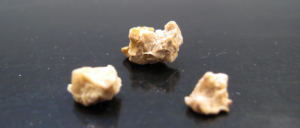
Finally, a study was done examining whether the kidneys have a microbiome (community of fungi, viruses, and bacteria). The answer is yes, the kidneys have a microbiome and the composition of the microbes plays a role in kidney health and whether a person develops kidney stones or not. This makes sense - all our other organs have microbiomes.
This multi-part study showed that the urinary tract is not sterile, and that low levels of bacteria are normal. Additionally, they found that the presence of the beneficial bacteria L. crispatus is found in the absence of kidney stones, while E.coli is associated with the development of kidney stones. (Interestingly, L. crispatus is also found in the healthy vagina and can treat bacterial vaginosis.)
The researchers found that the L. crispatus somehow blocked E.coli's ability to form kidney stones.
Antibiotic use was associated with bacteria that promoted the development of kidney stones because antibiotics kill off Lactobacillus species and promote the growth of kidney stone forming species (e.g., E. coli). Other studies also find that bacteria such as E.coli (as well as Proteus and Klebsiella) are frequently associated with UTIs, kidney stone formation, and kidney infection (pyelonephritis).
From Medical Xpress: First full characterization of kidney microbiome unlocks potential to prevent kidney stones
Cleveland Clinic researchers have found definitive proof of a kidney microbiome that influences renal health and kidney stone formation, demonstrating that the urinary tract is not sterile and low levels of bacteria are normal.
The Nature Communications publication describes the rigorous multi-pronged approach a team led by Aaron Miller, Ph.D., and José Agudelo, MD, used to identify and characterize the small bacterial community by combining preclinical, human and dish studies.
They also identified certain bacteria within the microbiome that could promote or block kidney stone development and showed that antibiotic misuse (commonly associated with kidney stone development in a hospital setting) skewed the microbiome towards stone-promoting bacteria.
Dr. Miller hopes his team's findings will help overturn the concept of a sterile urinary tract and lead to better prevention or treatment options for a condition that hasn't seen major medical advances in over three decades.
Normal bacteria levels in urine are very low, but they are rarely zero. Despite this, the urobiome—microbiome of different organs in the urinary tract including the bladder and kidneys—has been a debated topic since its discovery in human urine less than 15 years ago.
The team's methods demonstrated each of these aspects for bacteria found in the urinary tract. Their research also showed that bacteria living in the urinary tract were not only there because of disease, since they found them in the urinary tract of people without evidence of urologic disease.
Other studies had shown that two species Drs. Miller and Agudelo had identified—E. coli and Lactobacillus crispatus—had been associated with the presence and absence of kidney stones, respectively. The researchers asked if the metabolic activity of their newly discovered microbial community played a role in kidney stone formation.
To see whether the kidney microbiome could influence stone formation, the researchers grew bacteria using a special chamber that mimics the movement of urine in our kidneys. They then added the "raw ingredients" of kidney stones, oxalate and calcium, to see what happened.
Several large, stone-like crystal structures formed in chambers growing E. coli. Chemical and X-ray analyses revealed these structures were indistinguishable from human kidney stones. No stones formed in the chambers growing Lactobacillus in this way.
Growing the two bacteria together resulted in very small crystal structures that were structurally and chemically different from kidney stones, indicating that Lactobacillus somehow blocks E. coli's ability to form kidney stones.
In preclinical models, the team also saw that antibiotic overuse shifted the balance of the kidney microbiome away from the healthy Lactobacillus towards the stone-forming E. coli. They believe their findings, taken together, may explain why individuals on long-term antibiotic courses are more prone to developing kidney stones.
"If the kidney microbiome can influence kidney stones, it can likely influence other kidney diseases as well," Dr. Miller adds.
